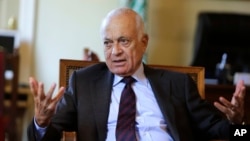Arab League Secretary-General Nabil Elaraby called for broad-based action to confront the growing threat of Islamic State militants, as he met with Arab foreign ministers to discuss the growing list of conflicts across the Arab world during their annual September session Sunday in Cairo.
Elaraby said the number of threats facing the Arab world were unprecedented and of an existential nature.
He said the threats include social and economic troubles, revolutions, and armed insurgencies with extremist and terrorist ideologies that threaten the unity of nations and their political, social and economic orders.
Elaraby stressed the Islamic State "terrorist organization is threatening not just the authority of the state [of Iraq], but its very existence.”
Such threats, he said, “require a comprehensive Arab response, including security, political, economic, philosophical and cultural measures.”
Putting coalition together
U.S. Secretary of State John Kerry spoke with Elaraby by telephone Saturday to discuss the need for the Arab League members to take a strong position in the coalition that is being put together to confront the militants, including measures to stop the flow of foreign fighters, clamp down on its financing and to combat its ideology.
Syrian opposition leader Hadi al-Bahra also addressed the gathering, insisting opposition fighters were caught between forces.
Al-Bahra said the rebel Free Syrian Army is fighting a crucial battle against the oppressive regime forces of President Bashar al-Assad, as well as the black terrorism of the Islamic State group, despite modest means, standing as a bulwark against such forces spreading across the entire region.
Moroccan Foreign Minister Salaheddine Mezouar told the session the Arab world is entering unknown territory, with the spread of terrorism and sectarianism in Arab society.
Mezouar said the situation is getting out of control as terrorism gains in sophistication in the areas of organization, financing and recruiting, at the same time as sectarianism and religious chauvinism are burning the foundations of our society.
Well-known Egyptian political sociologist Said Sadek told VOA the attempt by NATO and the United States to build a coalition against the Islamic State militants is reminiscent of previous efforts to fight Saddam Hussein or the Taliban.
But he argued the need to keep fighting new terror threats indicates that previous efforts may have been in vain.
“The American policy since 9/11 to fight terrorism has failed,” Sadek said. “If we are in 2014 still fighting terrorism, then you have to question the policy: What really happened? What happened to the war on terrorism?”
Arab League foreign ministers concluded their meeting Sunday by agreeing to impose all necessary measures to combat the Islamic State fighters and to cooperate with international and regional efforts to fight terrorist groups.
The ministers also endorsed a UN Security Council resolution calling for efforts to halt the flow of logistical, military and financial support to militants in Syria and Iraq.





